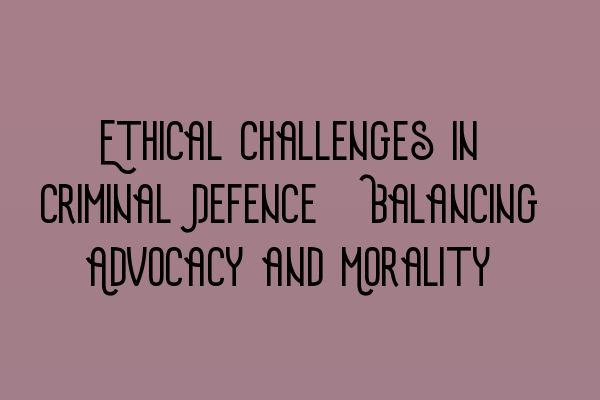Ethical Challenges in Criminal Defence: Balancing Advocacy and Morality
As a criminal defence solicitor, one of the most pressing challenges you will face is finding the delicate balance between advocacy and morality. Criminal defence work presents unique ethical dilemmas that require careful consideration and navigation. In this blog post, we will explore some of these challenges and discuss strategies for maintaining professional ethics while zealously advocating for your clients.
The Presumption of Innocence
The cornerstone of criminal defence is the presumption of innocence. Every person has the right to be considered innocent until proven guilty in a court of law. As a defence solicitor, it is your duty to advocate for your client’s innocence and challenge the prosecution’s case. This requires a strong commitment to the principles of justice and fairness.
To fully understand the concept of the presumption of innocence and its implications, it is crucial to review the SQE 1 Practice Exam Questions.
Confidentiality and Privilege
Another ethical challenge faced by criminal defence solicitors is maintaining confidentiality and legal privilege. Clients must feel comfortable disclosing all relevant information, no matter how incriminating it may be. You have a professional duty to protect this information and maintain the trust placed in you by your clients.
In order to prevent any breaches of confidentiality or professional misconduct, it is essential to stay up to date with the latest legislation and guidelines. Detailed knowledge of legal privilege is crucial, and it can be further enhanced through SQE 2 Preparation Courses.
Ensuring Fair Trials
A crucial aspect of criminal defence work is ensuring fair trials for your clients. This includes upholding the principles of due process, procedural fairness, and the right to a fair hearing. It requires a delicate balance of advocating for your client’s interests while respecting the integrity of the justice system.
To prepare yourself to uphold these principles to the fullest, you can benefit from the comprehensive SQE 1 Practice Mocks FLK1 FLK2 offered by our firm.
Dealing with Ethical Conflicts
At times, criminal defence solicitors may face ethical conflicts between their duty to the court, the duty to their client, and their own moral compass. These conflicts can arise when a client admits to being guilty but requests you to present a defence against the evidence.
Resolving such conflicts requires a thorough understanding of the ethical principles governing the legal profession. It may also be beneficial to seek guidance from experienced professionals or engage in discussions within legal communities to gain insights into different perspectives.
Striking the Balance
Striking the balance between advocacy and morality is not an easy task, but it is essential for criminal defence solicitors. It requires maintaining trust, confidentiality, and professional integrity while fighting for your client’s rights.
To stay updated with the latest developments in criminal law and practice, it is crucial to engage in continuous professional development. Our firm offers various SQE 1 Preparation Courses that can help you enhance your knowledge and skills.
Conclusion
The ethical challenges faced by criminal defence solicitors are complex, but with careful consideration and continuous professional development, you can navigate them successfully. Upholding the principles of justice and fairness while advocating for your clients is both a challenging and rewarding responsibility.
To learn more about upcoming SRA SQE exam dates and other resources, visit our SRA SQE Exam Dates page.
